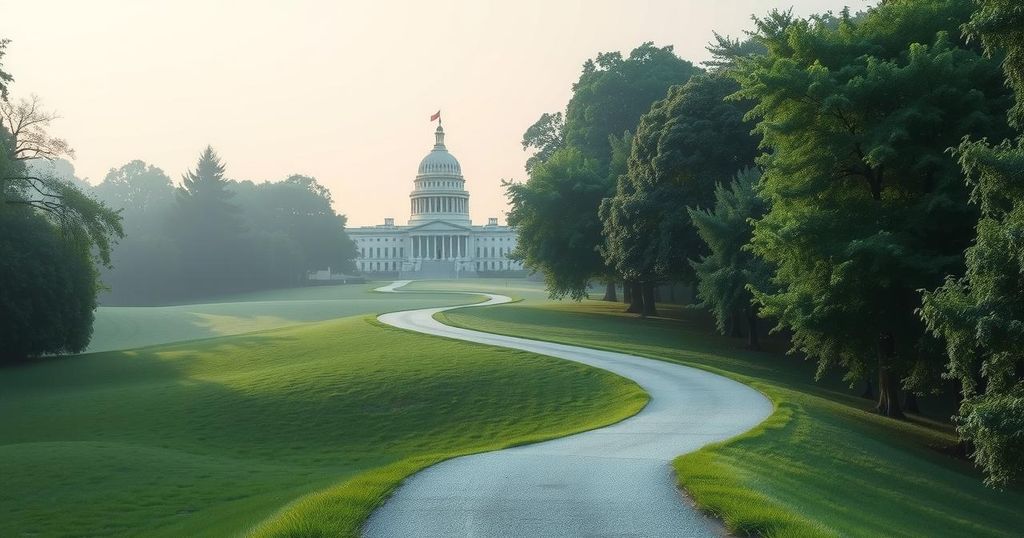Cameroon Elections: Paul Biya’s Continued Rule and Its Implications

President Paul Biya, at 91, prepares to run for an eighth term in the forthcoming 2025 elections, raising concerns about his age and health. His sustained rule has drawn both support and criticism, especially amidst ongoing civil unrest and economic stagnation. As opposition parties remain fractured, the future of Cameroon’s governance is clouded with uncertainty regarding potential leadership changes and economic recovery.
As Cameroon approaches its upcoming elections, the 91-year-old President Paul Biya is expected to run for an eighth consecutive term, potentially solidifying his status as Africa’s longest-serving leader. Political commentator Dr. John Akpo expressed confidence in Biya’s candidacy, notwithstanding concerns regarding his health. “There is no doubt about President Paul Biya’s candidacy for the next election,” he stated, while party member Elvis Ngolle Ngolle emphasized that discussions about post-mandate planning are unwarranted at this point.
Having ruled for over 42 years, if Biya wins, he would be 99 by the next elections in 2032. Akpo criticized some opposition leaders who seemingly support Biya, describing them as adjuncts to the ruling party rather than genuine rivals. He lamented, “This is the greatest wickedness that has fallen on this nation, and many Cameroonians are not proud of it,” voicing widespread discontent regarding the political landscape.
While Biya is credited with fostering multi-party democracy and enhancing relations with Western nations, ongoing civil unrest from Anglophone separatists has severely affected the economy. Opposition lawyer Tamfu Richard suggested that Biya’s advanced age may undermine his effectiveness in dealing with critical issues. “He’s unable to go to those zones due to his age,” Richard noted, emphasizing Biya’s lack of direct engagement with regional crises.
Critics argue that instead of seeking dialogue, Biya has taken repressive measures against political dissent, as evidenced by the jailing of peaceful protestors, including Maurice Kamto, under contentious circumstances. The ruling Cameroon People’s Democratic Movement (CPDM) relies significantly on coalition partners such as the Democratic Movement for the Defense of the Republic (MDR) and a UPC faction, although their influence is diminishing, complicating governance.
Recent developments pointed to a dichotomy between the Church and the state as Catholic bishops commented on the need for better governance and living conditions. Government representatives challenged this perspective, insisting that such calls were not direct demands for Biya’s resignation. Solomon Lyonga, the Diocese’s communications director, clarified, “No bishop has asked the president to step down,” affirming the Church’s role in encouraging government responsibility.
Despite indications of slight economic recovery, Cameroon’s GDP growth decelerated in 2023 to 3.3%, reflecting prevalent inflation and civil strife. Approximately 23% of Cameroonians live below the international poverty threshold, with burgeoning corruption further complicating recovery efforts. Dr. Akpo remarked that “corruption is at the bone marrow of every political being in Cameroon,” highlighting profound discontent among citizens.
Ultimately, structural inadequacies, including poor infrastructure and an over-reliance on commodity exports, impede sustained growth. While doubts regarding Biya’s viability persist, the fragmented opposition remains unable to present clear alternatives. While some citizens seem comfortable with stability, others are concerned about Biya’s capacity to fulfill his presidential duties effectively. Michele Ndoki, an opposition lawyer, stated, “We [the opposition] have been saying no,” showcasing the growing urgency for change in governance.
The article delves into the political landscape of Cameroon as it anticipates the 2025 elections, centered on the enduring presidency of Paul Biya. It explores the implications of his potential re-election at 91 years of age, the criticisms surrounding his governance amid rising civil unrest, and concerns over his political legacy and health. Amidst discontent with the current political regime and the lack of viable alternatives within the opposition, the situation presents a complex interplay of governance, economic challenges, and societal expectations.
In summary, as Cameroon approaches another electoral cycle with President Paul Biya likely running for office again, the nation grapples with profound political and economic challenges. Biya’s potential re-election raises critical questions about his fitness for leadership at 91 and the implications of continued stagnation in governance. Compounded by internal conflicts and a fractious opposition, the prospects for genuine democratic reform and socioeconomic recovery remain uncertain under another term for Biya.
Original Source: www.dw.com







